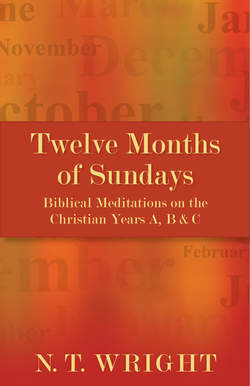Читать книгу Twelve Months of Sundays - N.T. Wright - Страница 42
На сайте Литреса книга снята с продажи.
ОглавлениеDay of Pentecost
Numbers 11.24–30
Acts 2.1–21
John 7.37–39
Jesus, quoting Scripture, says that rivers of living water will flow out of the believer’s heart. But no Old Testament text says exactly that. Which Scripture is he referring to, then?
Isaiah 55, of course, issues God’s invitation to all who are thirsty to come and drink. This, however, is not the part of Jesus’ saying that carries the phrase ‘as scripture says’. No: the ‘rivers of living water’ seem to evoke the great river which flows out of the restored Temple in Ezekiel 47, to make even the Dead Sea fresh. The image goes all the way back to the second chapter of Genesis; to call it up indicates the renewal of creation. And it goes all the way on to Revelation 22 – though where the river flows to there is not clear, since the sea, symbolizing the forces of chaos and evil, has been abolished altogether (21.1). Jesus takes this wide-ranging and powerful image and gives it a further twist.
There is a place in the Scottish Highlands where the broad and tranquil River Dee is funnelled in a swirling and seething foam through a gap in solid rock, narrow enough for a foolish teenager to jump across. (Don’t ask me how I know that.) So it is here. The four great rivers that flowed from the garden, the great new river that will stream from the Temple, are to come rushing and churning into, and (equally importantly) out of, the one who believes in Jesus. All the new life of God’s new creation is to be focused on, and channelled through, each believer.
To invoke or invite the Holy Spirit, then, is not simply to hope for a gentle nudge from time to time, a quiet sense that things are going to be all right after all, though that (thank God! ) is often how the Spirit’s presence is known. It is to take the risk of having all that wild, untameable energy sweep through us. The resulting transformation can be dramatic, something which Christians of many years’ standing can easily forget. But the rivers of living water have a purpose. They are not bubbling and whirling around for the sake of it. They are designed, not simply to satisfy our thirst (though they will more than do that), but to irrigate the land beyond us. If the rock is worn into a new shape in the process, so be it. If the expected, even the official, channels seem to be bypassed, as with Eldad and Medad, so be it.
Peter’s speech on the day of Pentecost was an attempt to explain how God’s wind had come to blow in this way, how God’s fire had escaped from the fireplace of the Temple and was striking flames all over the place. It was nothing short of the promised new creation, undoing the effects of the fall and of Babel. Don’t trivialize Pentecost. Think how the Spirit-imagery works. Water, wind and fire are not tame.
